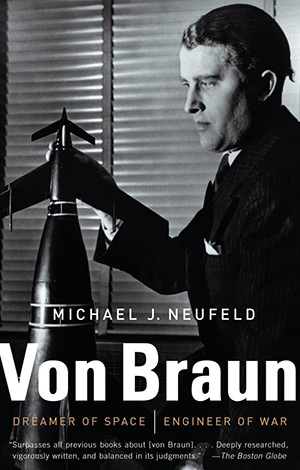March 23 is the 110th birthday of Wernher von Braun.
In WW2, this talented engineer and manager headed the team that developed the V-2 rocket. (The V-1 was an unrelated Luftwaffe development.) After the war, he was imported with 117 others as part of Project Paperclip and worked with the Army Ballistic Missile Agency in Huntsville, where he developed short- and intermediate-range ballistic missiles and was instrumental in launching our first satellite, Explorer 1. He went on to NASA when that agency took over the ABMA team and was essential in the design, development, and execution of the the Saturn V program and other aspects of Apollo. He left NASA when the post-Apollo programs, especially sending people to Mars, vanished off the planning boards. He died in 1977.
There is no denying the importance of his work for space exploration or his genuine, lifelong enthusiasm for those efforts. There's also no denying he lied about his actions during the war. While joining the Nazi Party and accepting an SS commission were largely forced on him, he continued his deadly work without protest (not, of course, that protest would have done him any good, but there is a Faustian theme that's unavoidable). He didn't create or supervise the slave-labor production program at the Mittelwerk, but he did see it in action. He argued to the SS commander on the utilitarian grounds that prisoners would produce better work if treated better, but when he was brushed off, he dropped it. When Germany disintegrated, he led his staff on a long, dangerous trek to hide key technology and tons of studies and design work until he could surrender to the Americans. The Project Paperclip staff and Army G-2 went light on the questioning in their urgency to get rocket engineers to the US. Ironically, the V-2's technical innovations had largely been matched by America's Robert Goddard, but Goddard couldn't get the funding to build missiles.
Von Braun and staff helped test captured V-2s and went to work on American missiles. He fought hard for the Army team to get the assignment to launch America's first satellites, but a commission picked the Naval Research Laboratory's Project Vanguard. When Vanguard was compromised by technical problems and a famous failure, von Braun was given the green light to launch an American satellite to match Sputnik 1, and did so on January 31, 1958. The Army lobbied hard to keep the ABMA team, but it was transferred to NASA Marshall, and the rest is space exploration history.
Von Braun might appear in the dictionary as the definition of "complicated." He believed his service his country in wartime was acceptable despite his disapproval of the war and the savagely evil conduct of his government. He enjoyed all the hedonistic delights of being a young baron, but once he married in 1947 he remained faithful for life. He had served Hitler and developed weapons but was a practicing Christian. (Interestingly, Hitler in hindsight should not have backed him: while the V-2 was deadly and frightening, the resources would have done more for the war if devoted to airplanes.) His V-2 staff worked clandestinely on space exploration ideas, and he was arrested at one point by the SS for allegedly slowing development of rocket weapons (this was, oddly a favorite charge in Stalin's purges). Von Braun pointed to this arrest as evidence of his lack of enthusiasm for war, although it was also a political ploy by SS leaders to take control of the program. The extent of his wartime activities and knowledge did not come out until the 1970s.
Surprisingly for a German aristocrat, he adapted quickly to
the American need to sell programs politically, emphasizing the wonders of
space exploration and the terror of Soviet missiles to the right audiences. He
believed strongly in a "Skunk Works" type of operation where everyone
was together and he and other leaders walked the shop floor. He adapted his
management style successfully to the needs of the enormous Saturn V program
where a Skunk Works wasn't possible.
Von Braun died relatively young of cancer and did not write
a memoir, although he left huge archives of plans and correspondence. To read
his story very much as he would have written it himself, read Wernher vonBraun: Crusader for Space, by his friend and teammate Ernst Stuhlinger (who
helped with my book The First Space Race) and Frederick Ordway. To read the
definitive biography, add Michael Neufeld's Von Braun: Dreamer of Space Engineer of War. The former was attacked by Mittelwerk survivors, among others,
for whitewashing him: the latter was attacked by von Braun relatives and
friends for being unfair to him, but I think it's the most thorough examination we'll ever get.
out von Braun.

Thank you Matt.
ReplyDeleteYou have shared a very informative article. I was looking for this kind of unique information. Please share more related information so I can get more knowledge.
ReplyDelete-Web Development Services